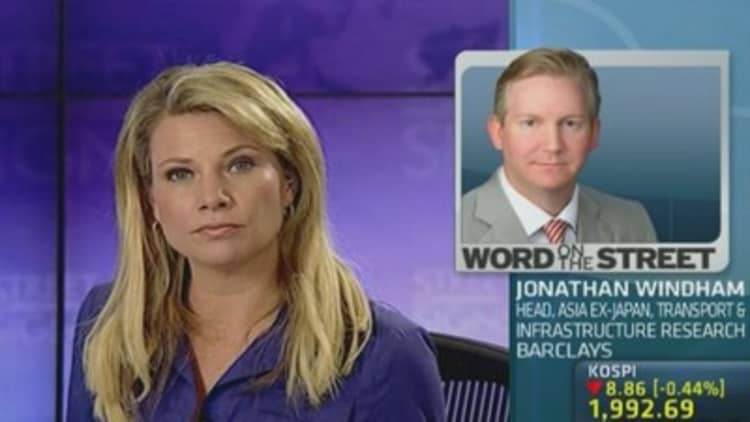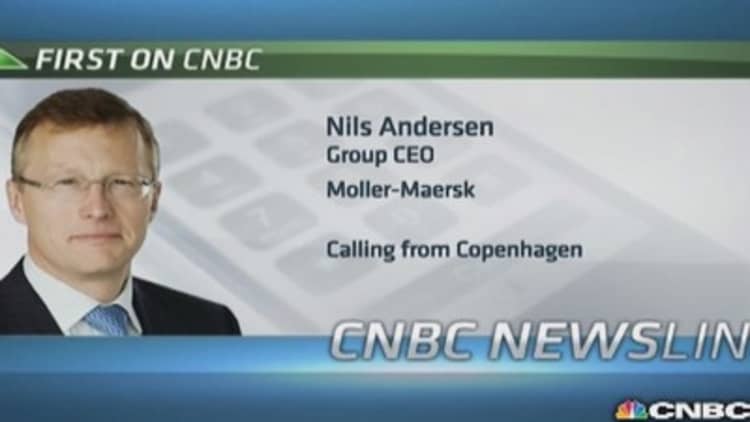
China's rejection of a game changing container shipping alliance has deepened pessimism in an industry plagued by overcapacity, analysts say.
A tie-up between shipping giants Maersk, CMA CGM and Mediterranean Shipping to pool their vessels, dubbed the P3 Alliance, fell apart after China's Ministry of Commerce rejected the plan late Tuesday.
Read MoreMaersk gives up ship pooling plan, shares fall
The proposal, announced nearly a year ago, aimed to save costs in an industry overwhelmed by a glut of supply and slowing demand. The announcement came as a surprise as the U.S. Federal Maritime Commission and the European Commission had not raised objections.
"The status quo in the container shipping industry is not working. We're in year six of a ten-year downturn for container shipping. The P3 alliance was an attempt to change the industry dynamic and longer-term investors will now look at this and say the industry has lost hope for any change," Jonathan Windham, head of Asia ex-Japan transport and infrastructure research at Barclays, told CNBC.
China's Commerce Ministry rejected the plan on the basis that it believed the alliance would control 47 percent of the Asia-to-Europe container shipping market and would not protect consumer interests. The parties "failed to demonstrate that the alliance would bring more benefit than harm, or that it is in line with the public interest," it said on its website.
Read MoreWhy the days of booming world trade may be over
The container shipping industry has suffered from a huge imbalance between demand and the number of vessels in recent years. Earlier this year, analysis group Alphaliner forecasted a 3 percentage point gap between global supply and demand for 2014, based on projected supply growth of 7.6 percent and demand growth of 4.6 percent.
Windham noted that consolidation remains the industry's sole hope: "If supply and demand won't get better, then we need to try and change the structure of the industry to get fewer players, which could bring about lower costs and higher profits.
However, not all is lost. "While China's move puts us right back to where we were, it may put more pressure on some alliance members to get another merger started," Windham continued.

Potential winners
Beijing's ruling on the tie-up is widely seen as a move to protect Chinese shippers rather than an effort to maintain fair play. While protectionism remains a major hurdle to industry consolidation, many experts say there are short-term benefits for Asian-based liners.
"The planned P3 alliance with a pooled fleet of 255 vessels could have put further competitive pressure on Asian liners, particularly those that have a relatively large exposure to the Asia-Europe market. Asian carriers could have potentially lost their market share on major East-West trade lines," said Vivian Tao of Citi Research in a note.
Read More
Barclays remains overweight on Asian shipping companies and Chinese names in particular like China Shipping Container Lines and Cosco Pacific. They also expect Malaysian port operator Westport to benefit as the alliance would have seen container volumes exit Westport to consolidate elsewhere.
The failed tie-up also dampened expectations for stabilization in freight rates, but Citi remains optimistic on the outlook for prices.
"With the synergy and cost savings from the alliance, unit cost will be further lowered, which will enable the P3 alliance members to compete more efficiently on pricing if they choose to. We believe the impact on freight rate rather small after the P3 rejection and the overall benefits to Asian carriers outweigh the negatives, if any," said Tao.

